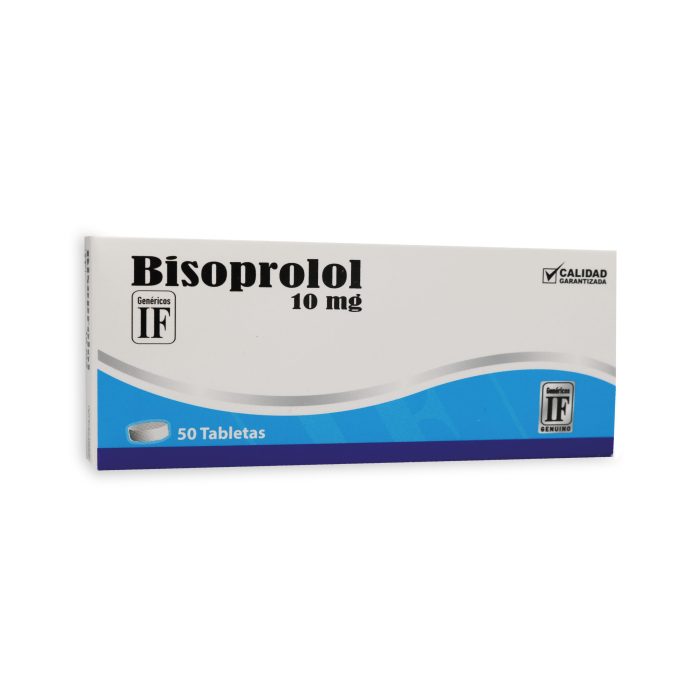Bisoprolol takes center stage in the world of cardiovascular medicine, acting as a powerful beta blocker that regulates heart rate and blood pressure. This medication plays a crucial role in managing a range of conditions, from hypertension and angina to heart failure, offering patients a chance to live healthier lives.
Understanding the intricacies of bisoprolol’s mechanism of action, its pharmacokinetic properties, and its therapeutic applications is essential for healthcare professionals and patients alike. This comprehensive overview explores the key aspects of bisoprolol, providing insights into its role in cardiovascular disease management and its potential benefits and risks.
Role of Bisoprolol in Cardiovascular Disease Management

Bisoprolol, a beta-blocker, plays a crucial role in the management of various cardiovascular diseases. Its mechanism of action involves blocking the effects of adrenaline and noradrenaline, which are hormones that increase heart rate and blood pressure. This blockade leads to a reduction in heart rate, blood pressure, and myocardial oxygen demand, making it beneficial for conditions like hypertension, angina, and heart failure.
Hypertension, Bisoprolol
Bisoprolol is a first-line treatment option for hypertension, particularly in patients with coexisting conditions like coronary artery disease, heart failure, or diabetes.
- It effectively lowers blood pressure by reducing cardiac output and peripheral vascular resistance.
- Studies have shown that bisoprolol can significantly reduce the risk of cardiovascular events, including stroke, heart attack, and death in hypertensive patients.
- The recommended starting dose for bisoprolol in hypertension is 1.25 mg once daily, which can be gradually increased to achieve the desired blood pressure control.
Angina
Bisoprolol is commonly used to treat chronic stable angina, a condition characterized by chest pain due to reduced blood flow to the heart muscle.
- It reduces myocardial oxygen demand by lowering heart rate and contractility, thereby alleviating angina symptoms.
- Bisoprolol can also improve exercise tolerance and reduce the frequency of angina attacks.
- The starting dose for bisoprolol in angina is typically 2.5 mg once daily, which can be increased as needed based on the patient’s response.
Heart Failure
Bisoprolol is an important medication for the management of chronic heart failure, particularly in patients with reduced ejection fraction.
- It improves cardiac function by reducing heart rate and afterload, leading to improved left ventricular function and reduced symptoms of heart failure.
- Bisoprolol has been shown to reduce mortality and hospitalization rates in patients with heart failure.
- The starting dose for bisoprolol in heart failure is usually 1.25 mg once daily, which is gradually increased to a target dose based on individual tolerance and response.
Future Directions and Emerging Research: Bisoprolol

While bisoprolol has proven effective in cardiovascular disease management, ongoing research continues to explore new applications, optimize existing formulations, and better understand its long-term effects. This ongoing research is vital for improving patient outcomes and expanding the therapeutic potential of bisoprolol.
New Formulations and Applications
The development of new formulations and applications for bisoprolol is an active area of research. One key focus is on improving drug delivery and enhancing patient compliance. For example, researchers are investigating extended-release formulations that reduce the frequency of administration and improve adherence to therapy. Another area of interest is the development of novel drug delivery systems, such as transdermal patches or inhalers, which could offer alternative routes of administration and potentially enhance bioavailability.
Bisoprolol emerges as a valuable tool in the fight against cardiovascular disease, offering a multifaceted approach to managing heart health. Its ability to regulate heart rate and blood pressure, coupled with its diverse therapeutic applications, underscores its significance in modern medicine. While potential adverse effects and contraindications require careful consideration, the evidence-based guidelines and ongoing research continue to refine our understanding of bisoprolol’s role in promoting cardiovascular well-being.
Bisoprolol is a beta blocker medication commonly used to treat high blood pressure and heart conditions. While bisoprolol works by slowing down the heart rate, pcsk9 inhibitors take a different approach by lowering cholesterol levels. Both medications play crucial roles in managing cardiovascular health, highlighting the diverse range of treatments available for heart-related conditions.